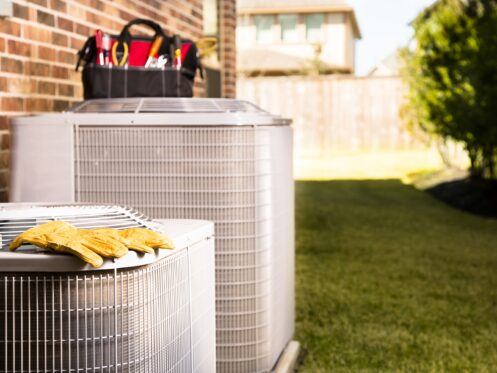If the air conditioner in your Beach Park, IL home is noisy, low-performing, and constantly in need of repairs, you’re probably on deck for an AC replacement. However, deciding between replacement and repair services isn’t always this easy. For instance, if your air conditioner is less than 10 years old and hasn’t had any major issues before, opting to fix it could be the most cost-effective choice even if doing so requires a considerable budget. Read on to determine what the best course of action might be the next time your cooling system breaks down.
Air Conditioners and Age-Related Issues
Without a doubt, one of the easiest ways to extend the lifespan of your home cooling system and limit your repair costs is by diligently performing routine maintenance. Regular filter changes and annual tune-up service will go a long way toward keeping your air conditioner running and keeping it running efficiently. However, all residential cooling systems have finite lifespans. No matter how well you take care of yours, it will not last forever.
Most air conditioners are expected to last 15 to 20 years from the date of their installation. If yours has already provided a decade or more of service, it’s fair to assume that additional problems are likely looming in your future. Paying several hundred dollars to fix your older AC now could mean having to pay a bit more just several weeks or months down the road. This is especially true if you have a large household and use your cooling system all of the time. In addition to the age of your unit, factors that increase or accelerate normal AC wear are vital to consider as well.
After their 10th year of service, most residential air conditioners have already lost approximately half of their efficiency. This means that they’re using twice as much energy as they did before to produce the same results. As such, they cost a lot to run, and they take markedly more time to create noticeable changes in indoor temperatures.
Aging air conditioners also tend to be noisy. The same air conditioner that once offered whisper-quiet operation could be keeping you up at night. Some older air conditioners additionally emit dank, musty smells during use given the increasingly large accumulations of dust, mold, and other allergens and contaminants within their interiors. If resident comfort and resident health are your top priorities, replacing your old AC is the right choice. Although professional maintenance and repair services can diminish noise and odors and offer modest improvements in efficiency, only a new AC will give you the level of safety and performance that you really want.
Air Conditioners and Size-Related Issues
Certain size-related issues can make AC replacement the right choice no matter how new or old your air conditioner may be. Some homeowners are eager to take advantage of the low AC prices that they find at big-box stores. In their efforts to save money, they choose their cooling equipment by themselves, often solely based upon available BTUs and property sizes. Unfortunately, choosing and installing an air conditioner based upon square footage alone can leave you with cooling equipment that’s far too big or too small for your home.
An undersized air conditioner will have to run nearly all of the time to affect a noticeable change in indoor temperatures. In fact, in their efforts to maintain comfortable indoor temperatures, some undersized ACs have to run non-stop throughout the entire cooling season. Conversely, oversized air conditioners constantly short cycle. These units turn on, emit quick, powerful blasts of cold air, and then rapidly cycle back off. These shorter cooling cycles greatly diminish their ability to effectively filter the indoor air and regulate indoor humidity. Much like the extended or non-stop cooling cycles of undersized air conditioners, the short cycling of oversized ACs greatly decreases their lifespans. It also sets the stage for frequent repair issues.
Whether you chose and installed your current air conditioner on your own or had it installed by an inexperienced or unethical company, if it is too large or too small for its service area, replacing it now is your best bet. A correctly sized air conditioner will cost a lot less to use. It will also create a safer and more comfortable living environment and minimize your risk of mold, mildew, and other humidity-related problems.
Do the Math
Many HVAC companies abide by the “$5,000 Rule.” To use it yourself, simply multiply the cost of your current AC repair by your air conditioner’s age. According to this rule, it’s always better to replace your air conditioner if the product of these two numbers is greater than 5,000, or $5,000. In theory, this answer gives homeowners a fairly accurate estimate of how much they’ll wind up paying for AC repairs overall throughout the remainder of their cooling system’s lifespan.
Don’t Forget to Account for Decreased Efficiency
When doing the math to determine the merits of replacement vs. repairs, it’s also important to account for age-related efficiency losses. Not only do many air conditioners lose as much as half of their efficiency after just 10 years of service, but these efficiency losses are progressive throughout the remainder of their lives.
If you’ve recently noticed a sharp increase in your home energy bills during the cooling season, your air conditioner is the most likely culprit. Throughout the nation, HVAC use accounts for approximately half of the average home energy bill. If you can, compare your current-year cooling costs to your cooling costs from last year and several years before. If your bills have steadily increased, additional age-related changes in your air conditioner’s performance will set the stage for even higher bills in the future.
AC Refrigerants and How They Impact Your Decision
Sometimes, the question of whether to repair or replace an air conditioner comes after more than 15 years of perfect AC performance. For example, if your air conditioner is 15 years or older and has never needed repairs before, paying several hundred dollars to fix it now might seem like an easy decision. However, air conditioners that are 15 years old or older typically use residential refrigerants that have been officially outlawed or are being phased out.
If your current air conditioner still uses R-22 or Freon as its refrigerant, now is the time to replace it. Once the industry standard for residential AC refrigerants, Freon has been completely phased out throughout the United States. In fact, the importation and domestic production of this coolant have been outlawed as well. Even if your current repair isn’t refrigerant-related, your future repairs could be. As the finite and rapidly dwindling supply of Freon is increasingly used, the cost of Freon recharge services for older air conditioners is rising. More importantly, now that this refrigerant and the models that rely on it are obsolete, it’s often hard to find HVAC technicians who are trained and qualified to handle it.
Freon was replaced by Puron or R-401A. Although better for the environment than Freon, Puron has recently been replaced by single-ingredient AC refrigerants that have virtually no impact on the earth’s ozone layer. With Puron-reliant air conditioners, many of the same phase-out-related concerns exist. Thus, replacing an older air conditioner with an AC that uses the latest refrigerants could make your life a lot easier. It will also reduce your carbon footprint, put your home on par with current regulatory standards, and diminish the costs of your future cooling system repairs.
Residents of Beach Park, IL can count on us for superior heating, cooling, and plumbing services. We also provide ductless mini-splits, RTU services, and preventative maintenance plans. If you need help determining whether to replace or repair your air conditioner, get in touch with Modern Heating and Plumbing now!


